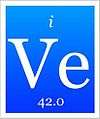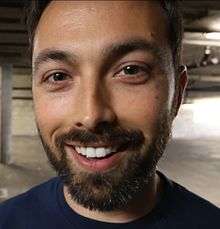Derek Muller
Derek Alexander Muller (born 9 November 1982[2]) is an Australian-born Canadian science communicator, filmmaker, television personality and inventor, who is best known for his YouTube channel Veritasium. Muller has appeared as a correspondent on the Netflix web series Bill Nye Saves the World since 2017.
Derek Muller | ||||||||||
|---|---|---|---|---|---|---|---|---|---|---|
 Veritasium YouTube channel logo | ||||||||||
 Muller in 2016 | ||||||||||
| Personal information | ||||||||||
| Born | Derek Alexander Muller 9 November 1982 Traralgon, Victoria, Australia | |||||||||
| Nationality | Australian Canadian | |||||||||
| Education | Queen's University (BSc) University of Sydney (PhD) | |||||||||
| Residence | Los Angeles | |||||||||
| Occupation | Science communicator | |||||||||
| Spouse(s) | Raquel Nuno | |||||||||
| Website | veritasium | |||||||||
| YouTube information | ||||||||||
| Channels | ||||||||||
| Years active | 2010–present | |||||||||
| Genre | Science, education | |||||||||
| Subscribers | 7.23 million+ (Veritasium) 555,000+ (2veritasium) 292,000+ (Sciencium) | |||||||||
| Total views | 819.43 million+ (Veritasium) 20.55 million+ (2veritasium) 3.92 million+ (Sciencium) | |||||||||
| ||||||||||
| ||||||||||
| Updated 2 August 2020 | ||||||||||
Early life and education
Muller was born to South African parents in Traralgon, Victoria, Australia and moved to Vancouver, British Columbia, Canada, when he was two.[3] In 2000, Muller graduated as the top student from West Vancouver Secondary School.[4] In 2004, Muller graduated from Queen's University in Kingston, Ontario with a Bachelor of Science in Engineering Physics,[5] and, after moving back to Australia, completed a PhD in physics education research from the University of Sydney in 2008 with a thesis, Designing Effective Multimedia for Physics Education.[6]
Career
Muller has been listed as team member of the ABC's television program Catalyst since 2008.[7]
Since 2011, Muller has continued to appear on Catalyst, reporting scientific stories from around the globe,[8] and on Australian television network Ten as the 'Why Guy' on the Breakfast program.[9] In May 2012, he gave a TEDxSydney talk using the subject of his thesis.[10] In 2015, he presented the documentary Uranium – Twisting the Dragon's Tail, which aired in July/August on several public television stations around the world.[11]
On 21 September 2015, Muller hosted the Google Science Fair 2015 Awards Celebration.[12]
He has recorded a podcast with Henry Reich of MinutePhysics, which was released on 26 November 2015.[13]
Muller has also won the Australian Department of Innovation Nanotechnology Film Competition and the Australian Webstream Awards for Best Educational & Lifestyle Series 2013.[14]
Starting in April 2017, he appeared as a correspondent on the Netflix series Bill Nye Saves the World.[15]
Muller presented in film Vitamania: The Sense and Nonsense of Vitamins, a documentary by Genepool Productions, released in August 2018.[16] The film answers questions about vitamins and the use of dietary vitamin supplements.[17]
Muller's works have been featured at Scientific American,[18] Wired,[19] Gizmodo,[20] and i09.[21]
YouTube
In January 2011, Muller created the educational science channel Veritasium on YouTube,[22] the focus of which is "addressing counter-intuitive concepts in science, usually beginning by discussing ideas with members of the public".[23] The videos range in style from interviews with experts, such as 2011 Physics Nobel Laureate Brian Schmidt,[24] to science experiments, dramatisations, songs, and—a hallmark of the channel—interviews with the public to uncover misconceptions about science. The name Veritasium is a combination of the Latin word for truth, Veritas, and the suffix common to many elements, -ium. This creates Veritasium, an "element of truth", a play on the popular phrase and a reference to chemical elements.
In July 2012, Muller created a second YouTube channel, 2veritasium. Muller uses the new platform to produce editorial based videos that discuss such topics as film making, showcasing behind-the-scenes footage, and for viewer reactions to popular Veritasium videos.[25]
In 2017, Muller began uploading videos on his newest channel, Sciencium, which is dedicated to videos on recent and historical discoveries in science.[26]
Reception
Veritasium videos have received critical acclaim. At Science Online 2012, "Mission Possible: Graphene" won the Cyberscreen Science Film Festival[27] and was therefore featured on Scientific American as the video of the week.[28] A video debunking the common misconception that the moon is closer than it is was picked up by CBS News.[29]
Two early successful Veritasium videos demonstrate the physics of a falling Slinky toy. The videos explain the following: when a slinky is held dangling vertically and then released, it can be observed in slow motion that the bottom end does not begin to move until the entire slinky has collapsed, making it look as if the slinky was defying gravity (i.e., floating). This counter-intuitive phenomenon inspired a wealth of media coverage, including the Toronto Star,[30] NPR,[31] and a segment on the BBC show QI.[32] Muller also created a segment on the topic for the Australian Broadcasting Corporation show Catalyst.[33]
Snatoms
Snatoms are a molecular modeling kit where the atoms snap together magnetically.[34]
The Kickstarter project for Snatoms was started on 11 November 2015 and hit its funding goal in 3 hours and 13 minutes. The project ultimately raised over 1300% of its target funding.
Opinions
Muller is a Facebook critic, and has denounced the ability to buy likes for a Facebook page illegally from "like farms" or "click farms" in developing countries or pay Facebook to promote a page.[35]
See also
References
- "24 Winners Announced at the Streamys Premiere Awards | The Streamy Awards". The Streamy Awards. 25 September 2017. Retrieved 16 March 2018.
- Veritasium (18 June 2018), My Life Story, retrieved 2 June 2019
- Derek Muller (6 February 2013). "Why Do Venomous Animals Live in Warm Climates?". Retrieved 22 September 2013 – via YouTube.
- Muller, Derek (4 May 2017). "Why I'm Not a Scientist". Retrieved 6 May 2017 – via YouTube.
- "Physicist, educator, and filmmaker Derek Muller, Sc'04". Alumni Career Spotlights. Queen's University. 2012. Retrieved 14 September 2013.
- Derek Muller (2008). "Designing Effective Multimedia for Physics Education" (PDF). University of Sydney. Retrieved 14 September 2013.
- "Meet the team". Australian Broadcasting Corporation. 14 February 2008. Archived from the original on 19 July 2016. Retrieved 14 September 2013.
- Derek Muller (11 October 2012). "Higgs Boson". ABC. Retrieved 22 September 2013.
- "The Why Guy". Breakfast (Australian TV program). Network Ten. 8 March 2012. Retrieved 22 September 2013.
- "Derek Muller: The key to effective educational science videos". TEDxSydney. 27 May 2012. Archived from the original on 10 August 2013. Retrieved 14 September 2013.
- Gay, Verne (27 July 2015). "'The Bomb' and 'Uranium' review: Two PBS documentaries, one insufficient, one engaging". Newsday. Retrieved 4 February 2020.
- Google Science Fair (21 September 2015). "Google Science Fair 2015 Awards Celebration". Retrieved 22 September 2015 – via YouTube.
- Derek Muller (24 November 2015). "Derek Muller revealing podcast in an AMA". Reddit. Retrieved 26 November 2015.
- "About". Veritasium. 28 April 2015. Retrieved 25 November 2016.
- Harwood, Erika (14 October 2016). "Karlie Kloss Is Teaming Up with Bill Nye". Vanity Fair. Retrieved 8 February 2017.
- "Dr Derek Muller – Presenter – Vitamania". Vitamania. Retrieved 14 August 2018.
- "Home – Vitamania". Vitamania. Retrieved 14 August 2018.
- Carin Bondar (15 March 2012). "Meet Derek Muller – Winner of the Cyberscreen Science Film Festival". Scientific American. Retrieved 14 September 2013.
- Rhett Allain (13 July 2012). "Veritasium Video Homework". Wired. Retrieved 14 September 2013.
- Jamie Condliffe (20 February 2013). "What is light anyway?". Gizmodo. Retrieved 14 September 2013.
- Robbie Gonzalez (9 October 2012). "This levitating barbecue is the coolest thing you'll see today". i09. Retrieved 14 September 2013.
- Derek Muller (2011). "Veritasium". Veritasium. Retrieved 14 September 2013.
- "The Element of Truth: an interview with Derek Muller". The Royal Institution. March 2012. Retrieved 14 September 2013.
- Derek Muller (23 October 2011). "Physics Nobel Prize 2011 – Brian Schmidt". Retrieved 13 February 2013 – via YouTube.
- Derek Muller (17 July 2012). "An Isotope of Truth". Retrieved 23 January 2014 – via YouTube.
- Muller, Derek. "Sciencium – About". Retrieved 6 March 2017 – via YouTube.
- Carin Bondar (24 January 2012). "Winners of the Cyberscreen Science Film Festival at Science Online 2012". Scientific American. Retrieved 13 February 2013.
- Bora Zivkovic (25 January 2012). "Video of the Week No. 27 January 25th, 2012". Scientific American. Retrieved 13 February 2013.
- Will Goodman (23 February 2011). "Guy asks "How far away is the Moon from Earth?"". CBS News. Retrieved 13 February 2013.
- Lesley Ciarula Taylor (27 September 2011). "The secret truth behind a dropping Slinky". Toronto Star. Retrieved 13 February 2013.
- Robert Krulwich (11 September 2012). "The Miracle of the Levitating Slinky". NPR. Retrieved 13 February 2013.
- "Just The Job". QI. Season 10. Episode 18. BBC.
- Adam Collins (19 April 2012). "Slinky Drop". Australian Broadcasting Corporation. Retrieved 13 February 2013.
- "About Snatoms - Magnetic Molecular Modeling Kit". Snatoms. Retrieved 10 May 2020.
- Cate Matthews (11 February 2014). "Is Facebook Making Money Off Fake 'Likes'?". HuffPost. TheHuffingtonPost.com, Inc. Retrieved 7 July 2016.
External links
- Muller, Derek (August 2012). "Derek from Veritasium". Test Tube. Brady Haran for the University of Nottingham.